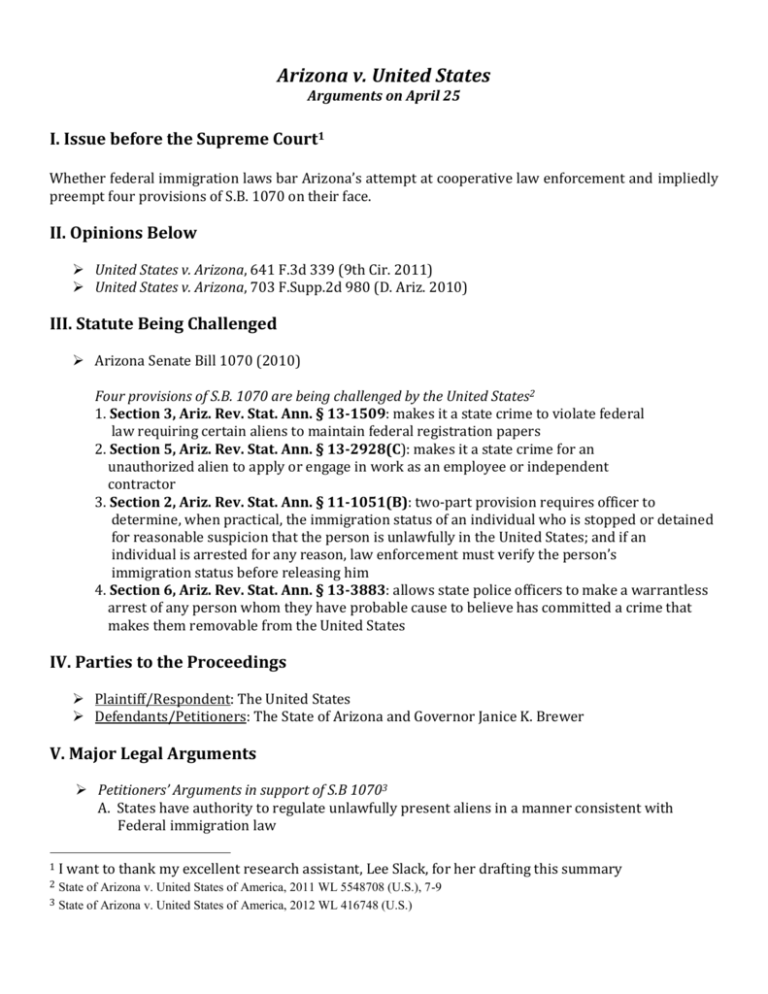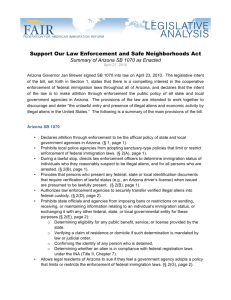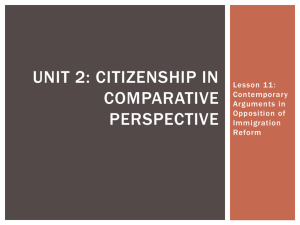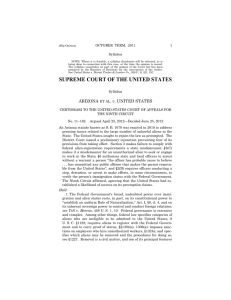STMU_HomecomingCLE2012KauffmanCimmigrationPaper
advertisement

Arizona v. United States Arguments on April 25 I. Issue before the Supreme Court1 Whether federal immigration laws bar Arizona’s attempt at cooperative law enforcement and impliedly preempt four provisions of S.B. 1070 on their face. II. Opinions Below United States v. Arizona, 641 F.3d 339 (9th Cir. 2011) United States v. Arizona, 703 F.Supp.2d 980 (D. Ariz. 2010) III. Statute Being Challenged Arizona Senate Bill 1070 (2010) Four provisions of S.B. 1070 are being challenged by the United States2 1. Section 3, Ariz. Rev. Stat. Ann. § 13-1509: makes it a state crime to violate federal law requiring certain aliens to maintain federal registration papers 2. Section 5, Ariz. Rev. Stat. Ann. § 13-2928(C): makes it a state crime for an unauthorized alien to apply or engage in work as an employee or independent contractor 3. Section 2, Ariz. Rev. Stat. Ann. § 11-1051(B): two-part provision requires officer to determine, when practical, the immigration status of an individual who is stopped or detained for reasonable suspicion that the person is unlawfully in the United States; and if an individual is arrested for any reason, law enforcement must verify the person’s immigration status before releasing him 4. Section 6, Ariz. Rev. Stat. Ann. § 13-3883: allows state police officers to make a warrantless arrest of any person whom they have probable cause to believe has committed a crime that makes them removable from the United States IV. Parties to the Proceedings Plaintiff/Respondent: The United States Defendants/Petitioners: The State of Arizona and Governor Janice K. Brewer V. Major Legal Arguments Petitioners’ Arguments in support of S.B 10703 A. States have authority to regulate unlawfully present aliens in a manner consistent with Federal immigration law 1 I want to thank my excellent research assistant, Lee Slack, for her drafting this summary 2 State of Arizona v. United States of America, 2011 WL 5548708 (U.S.), 7-9 State of Arizona v. United States of America, 2012 WL 416748 (U.S.) 3 1. Preemption Principles 2. State authority to regulate unlawfully present aliens B. The law enforcement provisions of S.B. 1070 sections 2(B) and 6 are constitutional 1. Federal law expressly authorizes states and the federal government to communicate and cooperate with each other on immigration enforcement 2. The Ninth Circuit misconstrued Section 2(B) and erred in holding Section 2(B) facially invalid 3. The authority conferred by Section 6 to make arrests for removable crimes is Constitutional a. State officers have inherent authority to enforce the immigration laws b. Section 1357(g)(10)4 recognizes states’ ability to make the arrests authorized by section 6 and the facial attack on section 6 cannot succeed C. Section 3 is constitutional 1. States are well within their right to prohibit conduct that is prohibited by federal law 2. Section 3 is an example of “parallel” enforcement 3. Section 3 is in line with Chamber of Commerce of U.S. v. Whiting5, which upheld an Arizona statute that revoked business licenses of those employing unauthorized aliens a. Court reasoned that the Arizona law was in line with the IRCA’s ban on employing unauthorized aliens and was therefore not preempted D. Section 5(C) is constitutional 1. States have the authority to regulate employment relationships 2. Section 5(C) reflects federal objectives of forbidding the hiring of unauthorized aliens E. Foreign criticism for S.B. 1070 has no preemptive effect 1. Foreign nations should not have the ability to invalidate a state law by simply criticizing it F. S.B. 1070 poses no disuniformity concerns 1. The fear that all fifty states will adopt their own immigration enforcement rules on top of federal law is unfounded—in fact, federal immigration enforcement has failed Arizona in many ways 2. Arizona is not attempting to create its own immigration policy, rather it hopes to go the extra mile in ensuring that its law closely mirrors federal law Respondents’ Arguments in opposition to S.B. 10706 A. The court of appeals correctly held that the challenged provisions are not permissible cooperative enforcement measures 1. The INA controls immigration regulations a. Role of foreign policy 2. The INA incorporates principles of cooperative enforcement measures subject to limitations and without interfering with the authority and discretion of the 4 8 U.S.C. § 1357(g)(10) states that “[n]othing in this subsection shall be construed to require agreement under this subsection in order for any officer or employer of a State or political subdivision of a State (A) to communicate with Attorney General regarding the immigration status of any individual, including reporting knowledge that a particular alien is not lawfully present in the United States; or (B) otherwise to cooperate with the Attorney General in the identification, apprehension, detention, or removal of aliens not lawfully present in the United States.” 5 Chamber of Commerce of U.S. v. Whiting, 131 S.Ct. 1968 2011 6 State of Arizona v. United States of America, 2011 WL 5548708 (U.S.) federal government in enforcing immigration a. Federal law expressly provides for state and local officials to cooperate in the enforcement of federal immigration b. Federal law provides that a state may enter into a written agreement to allow its officers to carry out immigration-enforcement functions subject to the discretion and supervision of the federal government c. Federal law provides that state and local law enforcement may cooperate with immigration-enforcement functions without a formal agreement 3. Criminal provisions of S.B. 1070 are not “cooperative” with federal law as they impose criminal punishment on conduct that federal law does not criminalize 4. Stop and arrest provisions a. Section 2, which imposes a mandatory immigration status check by state officers, is not “cooperative” with federal law because it strips officers of the ability to exercise discretion, which cannot be reconciled with INA policies of responsibility and discretion b. Section 6, which allows officers to make warrantless arrests of those whom they have suspicion of being unlawfully present, is not “cooperative” in that it allows for second-guessing of federal enforcement priorities B. Affirming the preliminary injunction against Section 6 did not create any circuit conflict a. The Tenth Circuit ruling in United States v. Vasquez-Alvarez7 i. The Tenth Circuit was faced with the question of whether state officers, when given the invitation to cooperate, were disabled from doing so by federal law—this is not the concern posed by Arizona ii. Court found an unexceptional example of cooperation between federal and state officers during an apparent drug transaction and held that the INA did not prohibit the arrest by the state officer C. Taking up these issues before any other court of appeals addresses them would be premature a. It is important for other courts of appeals to address these preemption issues, which will likely lead to a consensus 7 United States v. Vasquez-Alvarez, 176 F.3d 1294 (10th Cir. 1999)







